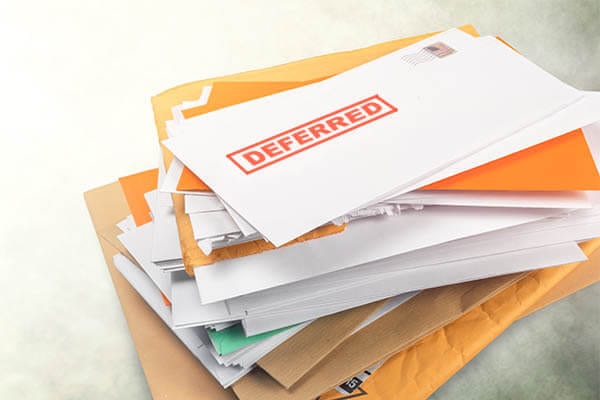If there’s an upside to the economic trauma brought about by the coronavirus pandemic — stipulated: we’re straining for a silver lining here — it’s the number and variety of financial relief options available to consumers.
Mortgage holders have forbearance programs. Auto insurers are giving breaks on policies for cars that are staying home. Payments on federally held student loans were suspended by the Cares Act, and some private student-loan companies are willing to work with customers.
Governors have ordered foreclosures and evictions halted. Utility companies won’t shut off services for nonpayment.
If you’re paying off a vehicle loan, there’s relief available: Contact the holder of your note. Banks, credit unions, and other vehicle-loan financiers are in a forgiving mood. After all, defaults are expensive; repossessions are costly and time-consuming; and lenders really don’t want to wreck a relationship with an otherwise reliable customer.
Are you leasing? Some carmakers are willing to extend leases by six months along with deferred lease-payment plans. This may not mean you get a six-month prorated bump in your mileage cap, however. Check with the leasing company to find out whether your extension includes bonus mileage.
Even credit-card companies have sympathetic ears for those walloped by COVID-19’s hobbling of the economy.
That’s a whole lot of apparent generosity growing out of these extraordinary times. And in most cases, all that’s necessary is contacting the company so it can record and accommodate your plight.
Still, if your earnings haven’t diminished during the shutdown and ever-so-gradual reopening, do yourself a favor: Resist every temptation to get in on the no-payments bandwagon.
While others are untangling complicated personal finances in 2021, your future self will thank you for your prudence.
The wisdom of sticking to your budget current cannot be overstated. If you haven’t been whacked by the shutdown downturn — or if you’re among those temporarily enjoying higher wages via federal unemployment benefits — don’t create down-the-road trouble for yourself.
Make your payments. Now. And every month that you can possibly can.
In fact, with all the money you’re saving by not eating out, fashion shopping, spending at the movies, ballgames, or theme parks, you may be among the fortunate who find themselves awash in leftover funds. Avoid online impulse shopping. You really do not need that green screen studio for Zoom meetings. Seriously. No.
Instead, use your savings to pay down credit cards and start — or fatten — your emergency fund. When/if the Second Wave© arrives, you could be the one waiting for hours on hold trying to apply for unemployment benefits.
If, however, you’re among the financially ailing, taking advantage of monthly payment holidays may be just what the doctor ordered. Before you dive in — and this must be emphasized — make absolutely certain you’re fully familiar with the fine print.
Reasons to Avoid Forbearance and Deferred Payments
Understand the terms, for openers. Consider waived and deferred. These get thrown around a bunch, almost as though they’re interchangeable, but they’re seriously different. A payment that’s waived doesn’t have to be made up to keep your account current. Deferred payments, by contrast, usually involve strict terms about getting the loan caught up at some point.
When that catching up must happen makes all the difference. Is the lender simply tacking missed payments onto the end of the loan, or are you expected to get caught up fairly quickly when the forbearance period ends?
This applies, especially, to mortgages that go into forbearance. To begin, do not confuse forbearance with forgiveness.
Forbearance allows the borrower to suspend or trim payments for a set period of time without triggering foreclosure proceedings. In exchange, the borrower agrees to resume regular payments at a specified time, as well as catching up the deferred total — principal and interest included — to restore the account’s good standing.
Managing the second half of that equation is the tricky part. In the extreme, lenders require repayment in a single lump sum. Gulp. Others will negotiate a payback schedule, or choose to recoup the deferred payments at the end of the loan.
The good news for those whose mortgages are federally backed is the Cares Act allows delaying payments for up to a year without accumulating additional interest.
Note, also, this: If taxes, insurance, and condo or homeowners association fees are included in your payment, you’ll have to make other arrangements. Forbearance affects only principal and interest payments.
Don’t get the idea, either, that just because it’s not hurting your credit score, securing a forbearance plan won’t raise eyebrows if you apply for a mortgage in the near future.
Lender policies are evolving in the wake of this once-a-century upheaval, so it’s difficult to predict how underwriters will weigh coronavirus-related forbearance participants. Did you request forbearance because you truly needed it, or simply because you schemed to stash monthly payments into an interest-bearing account?
For the latter, the superior advice remains: Stick to your budget.
Credit card issuers, too, are making unprecedented allowances. Those suffering coronavirus-related economic stress may find their lenders willing to do the following:
- Deferring required payments for a month or more.
- Waiving late fees.
- Waiving interest or lowering the interest rate.
- Implementing an extended payment plan.
- Increasing credit limits.
- Suspending reports of missed payments to the credit-tracking bureaus.
Again, know what you’re getting into. At the risk of hectoring: If you can make your payments, just do it. Otherwise, know these:
- Are your payments waived or merely deferred?
- If deferred, how quickly must they be made up?
- Will interest continue to accrue?
- If interest does accrue, how will that affect your payments when your forbearance period ends?
- Would you be better off arranging to make smaller minimum payments temporarily?
- Are you willing to make the contacts necessary to learn about each of your card issuer’s coronavirus-assistance plans?
If you’re in a quandary about how to manage your own unique plight in the Age of COVID-19, now would be a good time to summon extra help from one of the experts certified by the National Foundation for Credit Counseling.
Among the areas you’re sure to cover:
- Can you tap savings (but not your retirement accounts) to pay down some high-interest cards?
- Can you qualify for a zero-interest balance-transfer card?
- Can you qualify for an affordable lower-interest personal loan to consolidate your debt?
- Are you willing to allow a credit counselor to contact lenders on your behalf to seek forbearances or other relief?
Finally, has Life in the Age of Coronavirus opened your eyes to the precariousness of your personal finances? If so, your counselor may recommend a debt management plan, a strategy that, if successfully followed to its conclusion, will reduce and perhaps even eliminate your unsecured debt in 36 to 60 months.
Who knows? You could emerge from all this unscathed by COVID-19 symptoms but with coronavirus antibodies and a healthy bottom line to boot.

6 MINUTE READ
Home » InCharge Blog »
Sources:
- N.A. (2020, April 22) How To Reduce Or Delay Paying Your Bills During The COVID-19 Crisis. Retrieved from https://www.forbes.com/sites/allbusiness/2020/04/22/how-to-reduce-or-delay-paying-your-bills-during-the-covid-19-crisis/#de4e8675835a
- Barney, A. (2020, April 13) Why you should think twice about delaying your mortgage payments. Retrieved from https://www.cnn.com/2020/04/13/success/mortgage-forbearance-coronavirus/index.html
- Orton, K. (2020, May 18) What you need to know about asking for mortgage forbearance. Retrieved from https://www.washingtonpost.com/business/2020/05/18/what-you-need-know-about-asking-mortgage-forbearance/
- Tarpley, L.G. (2020, May 8) Banks are offering mortgage forbearance due to COVID-19, but customers who take it might struggle to get a home loan later on. Retrieved from https://www.businessinsider.com/personal-finance/coronavirus-layoff-mortgage-forbearance-future-home-loan-2020-5
- Vincent, J.M. (2020, April 24) Coronavirus Pandemic: What Should I Do if I Can't Make My Car Payment? Retrieved from https://cars.usnews.com/cars-trucks/what-to-do-if-you-cant-make-your-car-payment
- Rossen, J. (2020, April 29) The Best Way to Defer Your Credit Card Payments During the Coronavirus Shutdown, Explained. Retrieved from https://www.mentalfloss.com/article/623771/best-way-defer-your-credit-card-payments-during-coronavirus-shutdown-explained
- French, S. (2020, June 2) Can’t Pay Off Your Credit Card Due to Coronavirus? Your Bank May Be Able to Help. Retrieved from https://www.nytimes.com/wirecutter/money/credit-cards/coronavirus-credit-card-payment-relief/
- Gravier, E. (2020, June 16) ‘Don’t sweat your credit score right now,’ expert says amid coronavirus outbreak. Retrieved from https://www.cnbc.com/select/credit-score-tips-coronavirus/
- N.A. (ND) Understanding Coronavirus Relief Options. Retrieved from https://www.capitalone.com/updates/coronavirus/government-relief/
- Musinski, B. (2020, May 12) Can You Skip a Credit Card Payment Because of the Coronavirus? Retrieved from https://creditcards.usnews.com/articles/can-you-delay-a-credit-card-payment-because-of-the-coronavirus
- N.A. (ND) How To Maintain Financial Health During COVID-19. Retrieved from https://www.rockethq.com/learn/personal-finances/how-to-maintain-financial-health-during-the-covid-19-situation

















